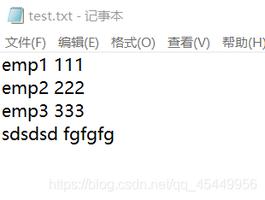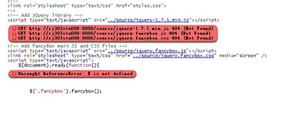C#实现彻底删除文件的方法
本文实例讲述了C#实现彻底删除文件的方法。分享给大家供大家参考。具体实现方法如下:
经常用360的文件粉碎,删除隐私文件貌似还不错的。不过C#也可以实现彻底删除文件。试了下用360文件恢复恢复不了源文件了。
主要代码如下:
public class AbsoluteFile{
public event EventHandler FinishDeleteFileEvent = null;
public event EventHandler FinishDeleteFolderEvent = null;
public event EventHandler DeleteErrorEvent = null;
public string ErrorString = string.Empty;
public void DoAbsoluteDeleteFile(object filePath)
{
try
{
string filename = filePath.ToString();
if (string.IsNullOrEmpty(filename))
{
return;
}
if (File.Exists(filename))
{
File.SetAttributes(filename, FileAttributes.Normal);
double sectors = Math.Ceiling(new FileInfo(filename).Length / 512.0);
byte[] dummyBuffer = new byte[512];
RNGCryptoServiceProvider rng = new RNGCryptoServiceProvider();
FileStream inputStream = new FileStream(filename, FileMode.Open);
inputStream.Position = 0;
for (int sectorsWritten = 0; sectorsWritten < sectors; sectorsWritten++)
{
rng.GetBytes(dummyBuffer);
inputStream.Write(dummyBuffer, 0, dummyBuffer.Length);
sectorsWritten++;
}
inputStream.SetLength(0);
inputStream.Close();
DateTime dt = new DateTime(2049, 1, 1, 0, 0, 0);
File.SetCreationTime(filename, dt);
File.SetLastAccessTime(filename, dt);
File.SetLastWriteTime(filename, dt);
File.Delete(filename);
WipeDone();
}
}
catch (Exception e)
{
WipeError(e);
}
}
public void DoDeleteFolder(object folder)
{
string folderPath = folder.ToString();
if (string.IsNullOrEmpty(folderPath))
{
return;
}
DirectoryInfo direct = new DirectoryInfo(folderPath);
FileSystemInfo[] filesystem = direct.GetFileSystemInfos();
if (filesystem == null || filesystem.Length == 0)
{
direct.Delete();
}
else
{
foreach (FileSystemInfo fileItem in filesystem)
{
if (fileItem is FileInfo)
{
this.DoAbsoluteDeleteFile(fileItem.FullName);
}
else
{
DoDeleteFolder(fileItem.FullName);
}
}
}
if (this.FinishDeleteFolderEvent != null)
{
this.FinishDeleteFolderEvent(this, null);
}
}
private void WipeError(Exception e)
{
if (DeleteErrorEvent != null)
{
ErrorString = e.Message;
DeleteErrorEvent(this, null);
}
}
private void WipeDone()
{
if (FinishDeleteFileEvent != null)
{
FinishDeleteFileEvent(this, null);
}
}
}
顺便写了个简单的界面:
后台代码如下所示:
public partial class Form1 : Form{
private Thread dfileThread = null;
private string fileObjectPath = string.Empty;
private bool isFile = true;
public delegate void DefaulEventDelegate(object sender, EventArgs e);
public Form1()
{
InitializeComponent();
}
private void btnSelectFile_Click(object sender, EventArgs e)
{
isFile = true;
this.openFileDialog1 = new OpenFileDialog();
openFileDialog1.Multiselect = true;
openFileDialog1.Title = "请选择文件";
openFileDialog1.Filter = "所有文件(*.*)|*.*";
if (openFileDialog1.ShowDialog() == DialogResult.OK)
{
this.txtFilePath.Text = openFileDialog1.FileName;
}
fileObjectPath = this.txtFilePath.Text.Trim();
}
private void btnSelectFolder_Click(object sender, EventArgs e)
{
isFile = false;
this.folderBrowserDialog1 = new FolderBrowserDialog();
folderBrowserDialog1.Description = "请选择文件路径";
if (folderBrowserDialog1.ShowDialog() == DialogResult.OK)
{
this.txtFolder.Text = folderBrowserDialog1.SelectedPath;
}
fileObjectPath = this.txtFolder.Text.Trim();
}
private void btnAbsoluteDelete_Click(object sender, EventArgs e)
{
this.lblHint.Visible = true;
if(string.IsNullOrEmpty(fileObjectPath))
{
MessageBox.Show("请选择要粉碎的文件和文件夹!");
return;
}
AbsoluteFile dfile = new AbsoluteFile();
dfile.DeleteErrorEvent += new EventHandler(Dfile_DeleteErrorEvent);
if (isFile)
{
dfile.FinishDeleteFileEvent += new EventHandler(Dfile_FinishDeleteFileEvent);
dfileThread = new Thread(new ParameterizedThreadStart(dfile.DoAbsoluteDeleteFile));
dfileThread.IsBackground = true;
dfileThread.Start(fileObjectPath);
}
else
{
dfile.FinishDeleteFolderEvent += new EventHandler(Dfile_FinishDeleteFolderEvent);
dfileThread = new Thread(new ParameterizedThreadStart(dfile.DoDeleteFolder));
dfileThread.IsBackground = true;
dfileThread.Start(fileObjectPath);
}
this.lblHint.Text = @"正在删除...";
}
void Dfile_DeleteErrorEvent(object sender, EventArgs e)
{
if (!this.InvokeRequired)
{
MessageBox.Show((sender as AbsoluteFile).ErrorString);
}
else
{
this.BeginInvoke(new DefaulEventDelegate(Dfile_DeleteErrorEvent), new object[] { sender, e });
}
}
void Dfile_FinishDeleteFolderEvent(object sender, EventArgs e)
{
if (!this.InvokeRequired)
{
this.lblHint.Visible = false;
MessageBox.Show("删除完毕!");
}
else
{
this.BeginInvoke(new DefaulEventDelegate(Dfile_FinishDeleteFolderEvent),new object[] { sender,e });
}
}
void Dfile_FinishDeleteFileEvent(object sender, EventArgs e)
{
if (!this.InvokeRequired)
{
this.lblHint.Visible = false;
MessageBox.Show("删除完毕!");
}
else
{
this.BeginInvoke(new DefaulEventDelegate(Dfile_FinishDeleteFileEvent), new object[] { sender, e });
}
}
}
完整实例代码点击此处本站下载。
希望本文所述对大家的C#程序设计有所帮助。
以上是 C#实现彻底删除文件的方法 的全部内容, 来源链接: utcz.com/z/357600.html





